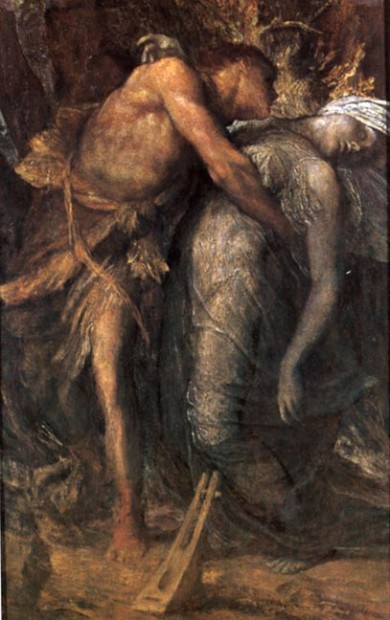Frost Opera Theater explores the Orpheus myth in a wide array of music, creatively presented

"Orpheus and Eurydice" by George Frederic Watts.
The myth of Orpheus, the musician who could charm the wildest beasts with the sweetness of his song, has fascinated poets, playwrights, filmmakers and composers for centuries.
“Visions of Orpheus,” the latest offering of the enterprising Frost Opera Theater, combines six operatic portraits of the legend that span the seventeenth through twenty-first centuries. While not every facet of the ambitious production worked Friday night at Clarke Recital Hall on the University of Miami campus, this musical collage proved to be compelling operatic theater, presented with artistic imagination and ingenuity.
The tale of Orpheus’ ill-fated trip to the underworld to bring his deceased wife Eurydice back to the world of the living has fostered a variety of musico-dramatic creations with widely diverse stylistic approaches. That the stately Baroque melodies of Monteverdi, jazzy tunes of Darius Milhaud and minimalism of Philip Glass managed to combine into a cogent theatrical experience is a tribute to Alan Johnson and Dean Southern, Frost Opera Theater’s ever-creative producers.
Sherri Tan’s striking scenic design mixes painting, photography and sculpture, forming a flexible playing space that spills out into the aisles of the small venue. Contemporary costumes emphasized the timelessness of the tale. Despite a few missteps, Southern’s spare, fast-paced direction emphasized the drama and pathos, flowing smoothly between the centuries. Unfortunately at Friday night’s performance the supertitles were often behind or ahead of the text, undercutting the show’s theatrical cohesion.
While Monteverdi’s 1607 opera was not the first setting of the legend, this masterpiece set the bar high for future versions. It was entirely appropriate to commence with the prologue from that historic work, the dancelike melodies of the four muses of music serving as an enchanting prelude to Gluck’s reformist version.
While his 1762 opera predates Wagnerian music drama by almost a century, Gluck’s visionary synthesis of music, theater and dance remains a moving, vibrantly theatrical creation. John Guarente’s chorus gave soulful voice to the score’s tragic strophes. Bedecked in a striking pants-suit, Lora Pacholka was a superb Orfeo, bringing depth of emotion to her expression of grief. Pacholka’s beautiful, light mezzo, agility and natural theatricality were magnetic. Barbara Monk’s mocking persona and fluttery vocalism, however, ill served the messenger Amor.
Darius Milhaud’s brief Les Malheurs d”Orphee (The Troubles of Orpheus) from 1924 recasts the hero as a folk doctor in a rural French village and Eurydice as a gypsy who has fled her insular caravan. Dating from the heyday of Les Six, the sounds of the Gallic music hall and chanson dominate the first act as the lovers unite and flee to the forest. The music becomes ever more harmonically complex as Eurydice becomes mortally ill and the gypsies arrive to take vengeance on Orpheus. In this mini-opera, Milhaud creates a varied sound world from the robust jazz of the villagers to the impressionist tones of the forest animals and the French pop sensibility of Orpheus’ arias. Much admired by no less than Ravel, this rarely heard score is a real gem.
Antoinne Barnes was a regal, suffering Orpheus with an attractive baritone, his meltingly beautiful soft tones definitely charming creatures wild and fair. Judy Marchman’s high, bell-like voice encompassed Eurydice’s passion and tragedy. Johnson vibrantly captured the deft syncopation of woodcutters’ chorus and eerie melodies of the animals.
Offenbach’s comedic take on the story Orfee aux Enfers (Orpheus in the Underworld) was all the rage in the Paris of the late 1850’s. In this staging, Eurydice is a bathing beauty who flirts with a waiter on the beach, and Katherine Mohr played the comedy to the hilt, tossing off the lively opera-comique tune with gusto.
It was a major programming miscalculation to follow this comedy sequence with Orpheus’ fatal glance and Eurydice’s death from Gluck’s opera, as the contrast between parody and heart-rending tragedy diminished both. Jared Glazer’s raw countertenor strayed from pitch in the great aria Che faro senza Euridice but Rebecca Henriques was an ideal Euridice, expressing pain and despair in exquisite, lyrical tones.
Transitioning seamlessly into the Epilogue of crossover composer Ricky Ian Gordon’s Orpheus and Euridice, Henriques provided a supple narration of Orpheus’ demise and the eternity of his song. Southern staged a striking tableaux as dancers encircled the couple with red cloth symbolizing the river, binding them together in death. Gordon’s brand of American lyricism mixes Samuel Barber and Stephen Sondheim to splendid effect.
Justin John Moritz’s superb high tenor powerfully commanded the protagonist’s final tragedy in the penultimate scene from Monteverdi’s version.
This fascinating evening concluded with four scenes from the first act of Philip Glass’ 1993 Orphee.
Alan Johnson is a former associate of Glass and understands his musical patterns like few others. In many ways the hero of the evening, Johnson conducted the wildly diverse scores idiomatically and with theatrical flair, even playing keyboard in some of the Monteverdi and Gluck scenes. Minor flaws aside, “Visions of Orpheus” is music theater at its best, and a must see for serious opera lovers.
Frost Opera Theater repeats “Visions of Orpheus” 7:30 p.m. Saturday and 2 p.m. Sunday at the University of Miami’s Clarke Recital Hall. 305-284-2400 www.music.miami.edu.
Posted in Performances
Leave a Comment
Sat Nov 19, 2011
at 12:35 pm
No Comments